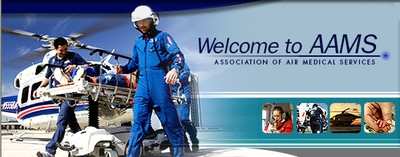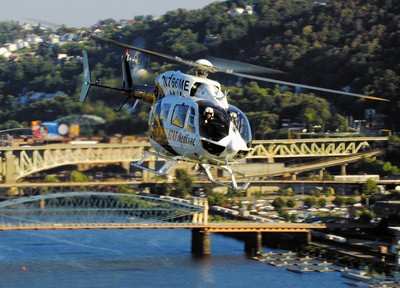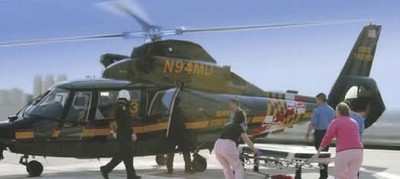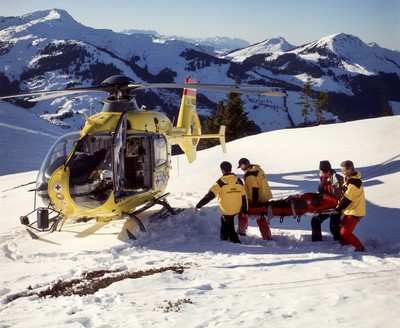'Heartened By Participation In Congressional Forum'
The Association of Air Medical Services (AAMS) President, Sandra
Kinkade, has urged greater inclusion and consideration of
air-medical and critical-care ground transport services in evolving
reform measures.

"We applaud the commitment of President Obama and Congress to
work together with industry stakeholders to curtail costs while
also expanding coverage and incorporating information technologies
aimed at streamlining the healthcare paperwork process," said
Kinkade. "We also were thrilled to be invited to present our
perspective at a healthcare reform town hall meeting that preceded
the debate in Congress this week. But we strongly recommend that
the voice of the medical transport community, which daily plays a
critical role in saving the lives of so many Americans will be
included in the larger national discussion."
Joining Kinkade in the call for greater inclusion in shaping
healthcare reform legislation was Dave Thomson, MS, MD, FACEP,
CMTE, CHC, of Syracuse, N.Y., who testified on behalf of AAMS
during the healthcare reform town hall event, held by Rep. Ed Towns
(D-N.Y.) in Brooklyn on May 9. Speaking inside a packed auditorium,
Thomson outlined the important role specialized medical transport
providers play, particularly in rural areas where they increasingly
serve as a life-saving healthcare safety net.

"Every 90 seconds, a critically ill or injured patient is
medevaced in the United States…that's 400,000 patients each
year," said Thomson, who also noted that medical transport
providers offer critical early-interventions for a number of
medical conditions, "including stroke, heart attack, trauma,
accident-related injuries, premature labor and birth - to name a
few."
But, reliance on air-medical transport, in particular, also has
surged - in part because of "aging baby boomers" who are retiring
to Sunbelt areas that lack quick access to specialty-care
hospitals, and because so many local jurisdictions have closed
their emergency departments or cut back on community-based
ambulance services. These factors need to be considered in proposed
healthcare reform measures, Thomson noted. Other
medical-transport-service concerns include Medicare payment
structure changes that have resulted in a dearth of rural trauma
and tertiary care-centers; specialty physician shortages, which
have frequently necessitated distant air transport; and rising
numbers of uninsured patients, particularly in recent months.
But, with a federal law - the Emergency Medical Treatment and
Labor Act (EMTALA) - which requires medical transport providers to
care for all patients regardless of ability to pay, "if we do not
cover our costs, we will soon be out of service," Thomson said.
"From the standpoint of emergency care providers, a system of
universal coverage, therefore, would also ensure greater coverage
of costs."
In addition, the system is in need of greater transparency in
order to reduce confusing and time-consuming paperwork burdens,
differing payment rates and insurance-coverage discrepancies. To
help streamline healthcare, AAMS encourages Congress to incorporate
proposals for universal information technology.

Other reform recommendations include revamping Medicare
reimbursement to include a differential for using the latest
aviation and medical-safety technologies; reimbursing emergency
medical services (EMS) for the cost of 24-hour preparedness;
funding EMS-related research and education; providing incentives
for promoting a greater culture of safety; and strengthening ties
between EMS, disaster preparedness and public health services.
Finally, AAMS is particularly concerned that sufficient funding
be allocated for disaster response. "If there is another Hurricane
Katrina or other disaster, be it natural or manmade, we must ensure
the ability to transport mass numbers of patients," Thomson
testified. "And while it is true that much has been done to address
bioterrorism and the growing threat of pandemic flu, it remains
that little funding has been devoted to strengthening our
emergency-care response and transport system.
"We do have faith, however, that the current healthcare reform
effort will help shore up our EMS system before - not after -
disaster strikes," he added. "And we respectfully ask that no
matter what changes are made, that sufficient money is allocated to
allow us to continue this most critical of missions."

The Association of Air Medical Services (AAMS) is the trade
association serving the entire air and critical care ground medical
transport community.
 Aero-TV: DeltaHawks Diesel Power Steps Into the Spotlight
Aero-TV: DeltaHawks Diesel Power Steps Into the Spotlight NTSB Prelim: Mooney Aircraft Corp. M20K
NTSB Prelim: Mooney Aircraft Corp. M20K ANN FAQ: Turn On Post Notifications
ANN FAQ: Turn On Post Notifications ANN's Daily Aero-Linx (12.20.25)
ANN's Daily Aero-Linx (12.20.25) Aero-News: Quote of the Day (12.20.25)
Aero-News: Quote of the Day (12.20.25)






